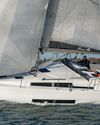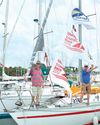
The life of a radar on board a cruising yacht is an easy one. Aside from a few hours of action when it’s misty or foggy, its younger sibling, AIS, does the heavy lifting of collision avoidance for most yachts. Once the preserve of large yachts and commercial vessels, however, radar is increasingly found on yachts under 40ft. It’s become more affordable, easier to install and more intuitive to use, but how about its operators? Have we advanced with it and are we using it to its full potential? I suspect not.
Like many cruising boats, the Challenge 72 that I co-skipper, CatZero, constantly receives and transmits AIS data. Since it runs in the background the volunteer watch leaders soon become familiar with it. The all-new B&G Halo 24 radar is turned off until needed. I took the opportunity of a light airs delivery from Cherbourg to Portsmouth after the Fastnet Race to introduce the crew to the new tool, and become better acquainted with the latest technology myself.
HOW IT WORKS
With radar, more than any other equipment, it’s important to understand how it works – what it can do and, more crucially, what it can’t. Radar stands for RAdio Detection And Ranging. It works by emitting a powerful radio wave and then listening for the echo as the signal bounces off objects in range. By timing how long the echo takes to return it can calculate distance with precision. Angles are harder to differentiate: the beam width of a traditional radar is 3-4° wide, which makes bearings less accurate than range.
This story is from the January 2024 edition of Yachting Monthly UK.
Start your 7-day Magzter GOLD free trial to access thousands of curated premium stories, and 9,000+ magazines and newspapers.
Already a subscriber ? Sign In
This story is from the January 2024 edition of Yachting Monthly UK.
Start your 7-day Magzter GOLD free trial to access thousands of curated premium stories, and 9,000+ magazines and newspapers.
Already a subscriber? Sign In

Yachting tailor-made for you
Wherever you want to sail, Goolets will give you a charter that exceeds your dreams

TECHNICAL CARING FOR A TEAK DECK
Dennis O'Neill outlines the best ways to protect and prolong the life of a modern teak deck - with a note or two of caution...

'I SPENT HOURS IN THE WATER IN HURRICANE CONDITIONS'
When John Quinn's boat was knocked down in the 1993 Sydney to Hobart yacht race, his harness broke and he found himself overboard at night in a hurricane-strength storm. Amazingly he lived to tell the tale, as Mark Chisnell discovered

FIRST TEST HANSE 360
Theo Stocker braves the wintry weather to go for a blast in Hanse's new big little cruiser to see whether she is as easily driven as her predecessors

Yachting Monthly Celtic Triangle race returns to Falmouth after 41 years
For the first time in over 40 years the Yachting Monthly Triangle Race, now called the Celtic Triangle, returns to its original host port of Falmouth where it all began in 1984.

A month navigating the Bijagos islands
Maxence and Victor Ansquer stop at Guinea-Bissau's isolated islands on their world voyage

Sunsail from the heart of the Adriatic
Discover the unspoiled charm of Croatia's stunning Adriatic islands from the Sunsail base at Marina Agana. Don't just sail, Sunsail

ADVENTURE SPIRITED CORINTHIAN SAILING
Sailing through the Corinth Canal to explore the Saronic islands was a breezy blast for Heather Prentice and family

ADVENTURE WILD CARIBBEAN
An Australian family revisit beloved small Caribbean islands and learn the joy of swimming with turtles

Dreamers and adventurers
One of life’s pleasures is to support others as they tackle their dreams and remotely sweep you aboard to share both triumph and disaster.